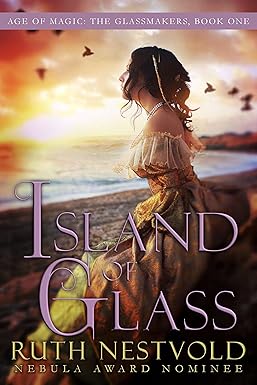Series: The Age of Magic:The Glassmakers Book 1
Genres: Fiction, Historical
Buy on Amazon

Island of Glass by Ruth Nestvold is a lush, immersive fantasy that transports readers to an alternate version of Venice, where magic and glassmaking intertwine in a world filled with intrigue, danger, and impossible choices. Nestvold skillfully reimagines familiar fairy tale tropes, weaving them into a unique narrative that blends historical fiction with fantasy elements.
The story follows Chiara Dragoni, a 17-year-old glassmaker living on the island of Murano in Venice. Glassmaking is not just her craft; it’s her family’s legacy and an art that is revered—though it comes with severe limitations. The glassmakers of Murano are bound by strict rules, the most notable of which is that they are forbidden from leaving the islands of the Venetian lagoon. When Chiara’s beloved uncle is arrested on the mainland and imprisoned in the notorious Doge’s Palace, Chiara’s world is turned upside down. To free him, she must draw on her magical talents and her skills as a master glassmaker, but her actions set off a series of events that change the course of her life in ways she never anticipated.
As Chiara navigates the treacherous waters of politics, magic, and family loyalty, she is faced with an impossible choice. In her efforts to help her uncle and to protect the secrets of her craft, Chiara unwittingly creates a powerful gift for a prince of Venice. This magical artifact has unintended consequences, pushing Chiara into an even more dangerous situation that forces her to confront the true cost of her choices. As she grows closer to a man she loves, Chiara must decide whether to sacrifice everything she knows—her family, her craft, and her very identity—in order to follow her dreams and pursue a future of freedom and love.
Strengths:
World-Building and Setting
Nestvold’s Venice is both familiar and fantastical, an alternate version of the city where glassmaking and magic are deeply intertwined with the very fabric of Venetian society. The author’s meticulous attention to historical detail adds richness to the setting, evoking the beauty and mystery of Venice and its famous glassmaking island of Murano. The blend of historical elements—like the Doge’s Palace, Venetian politics, and the bustling market scenes—with magical realism, alchemy, and witchcraft creates an enchanting atmosphere that readers will want to get lost in. The setting is a key strength of the novel, providing a vivid backdrop for the story while also amplifying the stakes and conflicts Chiara faces.Characterization
Chiara is a compelling protagonist—intelligent, strong-willed, and fiercely loyal to her family and her craft. Her internal struggle is relatable: torn between duty and desire, the weight of tradition and the allure of a different future. Her journey is about finding the courage to define herself beyond the rigid expectations placed on her, and readers will find her evolution both moving and empowering. The supporting characters, particularly Chiara’s uncle, the prince, and the love interest, help to deepen the narrative, offering contrasting perspectives on the themes of power, love, and personal sacrifice.Magical Realism and Alchemy
The element of magic in Island of Glass is beautifully handled. Chiara’s magical abilities are subtly integrated into the story, drawing on both her mastery of glassmaking and her magical heritage. The glass itself becomes a conduit for magic, and the objects she creates have a tangible impact on the world around her. The interplay between magic and craftsmanship is one of the most intriguing aspects of the story, adding layers of depth to the plot. The inclusion of alchemy and witches also adds an air of mystique and danger, especially when Chiara is faced with the consequences of her magical creations.Fairy Tale Influence
The novel takes inspiration from Cinderella, but it does so in a way that feels fresh and inventive. The "Cinderella" motifs—such as a girl from a humble background caught between a powerful love interest and the demands of her family—are present, but the novel flips these elements on their head. Rather than relying on a magical transformation or the prospect of marriage as a means of escape, Chiara must take agency in her own fate, often making difficult and painful decisions along the way. The fairy tale undercurrent adds an emotional resonance to the story, reminding readers of the universal themes of love, sacrifice, and identity.Weaknesses:
While Island of Glass offers a captivating and richly textured world, there are moments where the pacing slows down, particularly in the middle of the book when Chiara is navigating her magical dilemmas. At times, the narrative gets bogged down in the intricacies of the magical system, which may not always be easy to follow for some readers. There is also some predictability in the plot, particularly in how Chiara’s love story unfolds, though this is more of a minor quibble in an otherwise strong tale.

